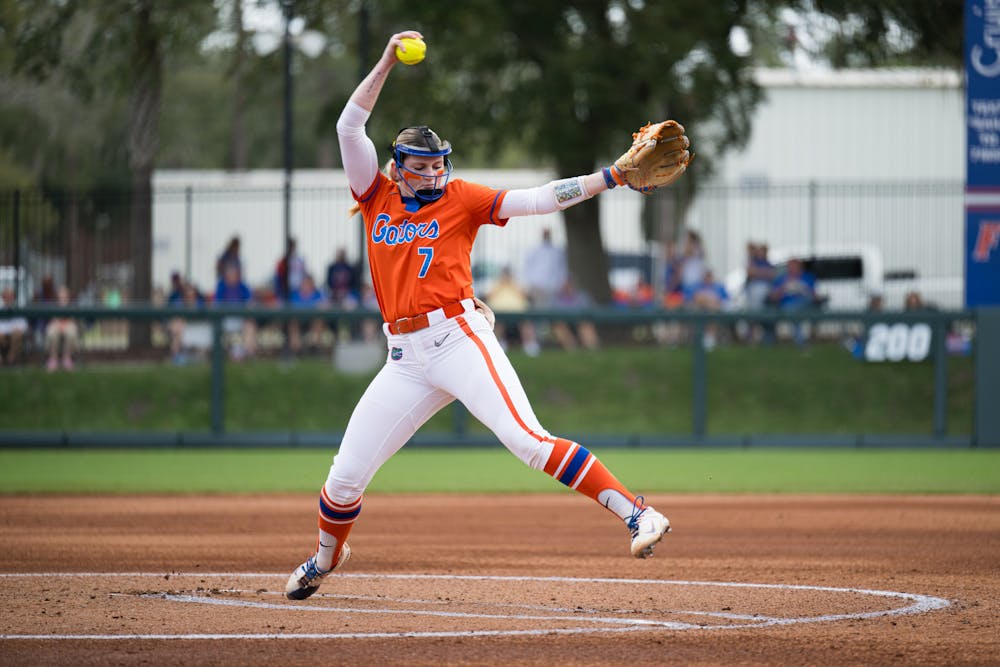The Clearwater Invitational is a foreign event to most. It sounds vaguely like an accounting expo. Possibly the name of a poorly organized, last-minute spring break frat trip. Maybe a Tom Cruise-spotting opportunity at the Church of Scientology’s headquarters.
However, every college softball coach in America can tell you what it is — for good reason.
Founded in 2019, the event brings 16 Division I softball programs to the Tampa area for four days of competition in early February. With 40 games across less than 84 hours, participating teams test themselves early in the year, usually against top competition.
In all of its six seasons (it didn’t occur in 2021 due to COVID-19 concerns), the event has drawn at least five teams from the NFCA’s rankings, including seven in last week’s 2025 edition. With top programs pitted against one another in the first or second weeks of their young seasons, the tournament’s results aren’t necessarily representative of what’s to come as the spring progresses. However, that doesn’t take away from Clearwater’s value, something Oklahoma State coach Kenny Gajewski explained while talking about the benefits of playing a difficult non-conference schedule.
“I look at that schedule and say, ‘Why are we doing this?’” he joked on Feb. 11. “And then in June, I go, ‘That’s why.’ I think that’s the recipe to host [in the NCAA tournament].”
He’s right. Every season since 2019, at least three teams from Clearwater have made the College World Series. For context, only eight teams go to Oklahoma City each year. While that rate may be a product of Clearwater attracting highly-ranked teams, that’s not always the case, nor do preseason rankings predict success in the season's final days.
Oklahoma wins the championship almost every year — that’s a given. But while it hasn’t attended Clearwater since 2019, it accomplishes something similar by playing a batch of ranked non-conference teams in smaller tournaments early each year. However, what’s more notable are the teams that walk out of Devon Park with their heads down on the final day of the season while the Sooners celebrate.
In the last four seasons that the Clearwater Invitational and the College World Series have both occurred, the national runner-up competed in Clearwater. Last year, it was Texas. The year before, Florida State. The year before that, Texas — again. Each of those teams began its campaign outside of the top 5 of the NFCA preseason rankings. But as the season waned, their ability to hold up against high-quality competition presented itself.
The question remains, though: How does this connect to Florida?
Well, this year, the Gators did what they frequently have done under 20-year head coach Tim Walton — they began the season ranked highly. Florida entered 2025 at No. 2 in the nation and remains in the top 3 after a shocking loss to No. 14 Duke on Sunday. That was UF’s second-ranked contest of the season, with the first being against the Blue Devils only two days earlier.
“There’s a lot of things we can improve to do better,” Walton said after the 8-1 defeat.
With that being said, the Gators almost definitely won’t have another opportunity to test themselves and show their improvements until conference play begins at No. 10 Texas A&M on March 7. That breakdown isn’t abnormal for Florida under Walton, though.
In the last five seasons, UF hasn’t faced more than two ranked teams before its SEC slate and hasn’t participated in a notable early-season invitational. In turn, come NCAA tournament time, UF has struggled against out-of-conference foes. Last year, Florida went 4-4 when facing ranked non-SEC teams. Two of those losses came over the final three days of its season, with the Gators’ 2024 coming to a close 6-5 (8) against Oklahoma.
This year, with one of the most talented rosters in the nation, UF will look to overcome those struggles in pursuit of a CWS title, but the question remains: Why doesn’t Florida challenge itself more early on?
With the vast majority of other national contenders beginning to believe that an early-season loss won’t kill their dreams of a championship, UF remains a step behind. As Gajewski, a former Florida assistant coach under Walton, alluded to, teams only improve by challenging themselves to begin their seasons.
“I’m not worried [about the losses]. It's early and I think that people look at the whole picture,” he said. “If we’re going to lose, let’s get it out of the way.”
For Florida, those losses loom, possibly coming at the wrong time — in June.
Contact Noah White at nwhite@alligator.org. Follow him on X @noahwhite1782.
Noah is a Spring 2025 Assistant Sports Editor and Copy Desk Chief. He's a second-year journalism major who enjoys reading and shamefully rooting for Tennessee sports teams. He is also a Liberty League Women's Soccer expert.






